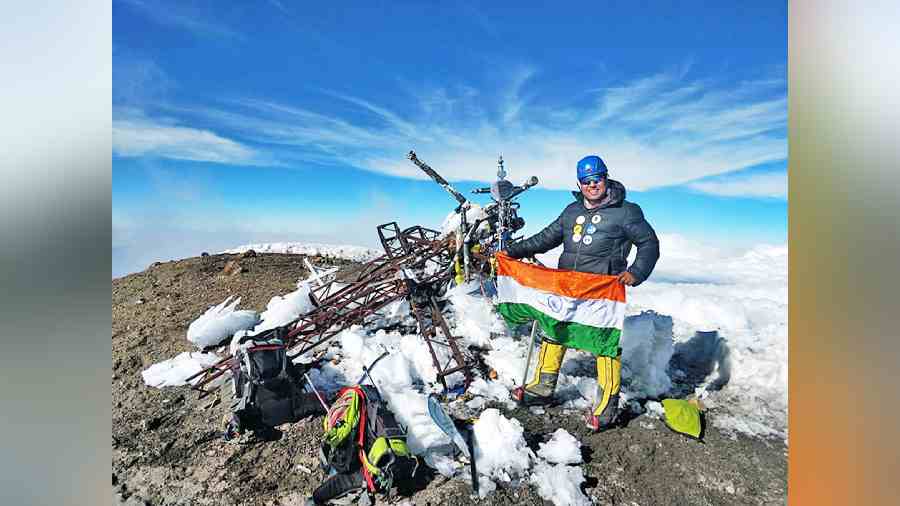Braving new worlds
Sir — Humans have always pushed the boundaries of knowledge. Expeditions to new territories bear testimony to the fact that our thirst for adventure is unquenchable. But with the advent of the internet, the spirit of exploration is dying out. Why venture out when vlogs can take us to the far reaches of the earth with the click of a button? Hearteningly, explorers like Satyarup Siddhanta still exist — he has climbed the major peaks in almost every continent and is now preparing to traverse the North Pole (“Because they’re there”, Dec 4). While reading about the adventurers of Tintin and Kakababu in our childhood, one would often imagine what it would feel like to grow up and be a globetrotter. People like Siddhanta are living that dream.
Rajanya Kar, Lucknow
Tepid response
Sir — The low voter turnout in the Gujarat assembly elections in spite of repeated appeals from the Election Commission is a clear indication that a considerable segment of the electorate is unenthusiastic about exercising its franchise. It seems that the attempts by the Union home minister, Amit Shah, to obtain votes by provoking communal tensions have not yielded results. Even though the exit polls predict a victory for the Bharatiya Janata Party, it certainly cannot claim that it has overwhelming support in the prime minister’s home state.
G. David Milton, Maruthancode, Tamil Nadu
Make amends
Sir — Talks are allegedly on between the authorities in charge of the British Museum and the Greek government for the repatriation of the 2,500-year-old Elgin Marbles, possibly in exchange for other treasures being lent to the British Museum (“UK bid to return Elgin Marbles”, Dec 5). However, the British prime minister, Rishi Sunak, has ruled out changing a law, which prevents the handing back of the Parthenon marbles. The sculptures are a lasting symbol of Greek ingenuity and should be returned to their country of origin. The same can be said of the Cullinan diamond from South Africa and the Kohinoor from India. There are also growing calls from the Caribbean nations for an official apology and reparations from their former coloniser. Britain must make up for its past crimes.
Sukhendu Bhattacharjee, Hooghly
Anger management
Sir — The chief minister of West Bengal, Mamata Banerjee, has condemned the attack on junior doctors at the SSKM hospital by some distraught family members (“CM ‘sorry’ for attack on doctors”, Dec 6). Incidents of physical assault on doctors are common in West Bengal. While physical violence against doctors cannot be condoned in any situation, the government should get to the root of such outbursts. Stringent punishment will not put an end to such attacks that are motivated by emotions. It is also true that patients die due to medical negligence. In such cases, justice has often proved elusive for family members. This can be frustrating. Bengal would do well to take lessons from countries like the United States of America where the grievance redressal system for victims of medical negligence is robust and inspires faith in people.
Kunal Saha, Calcutta
Needless apology
Sir — The Kashmir Files has earned little to no international recognition (“Virtuous rage”, Dec 6). Singapore refused to even certify the film for screening, stating that it had the “potential to cause enmity between different communities”. There was no need for the Israeli ambassador to India to apologise for the remarks made by the film-maker, Nadav Lapid. It could be argued that the apology from the ambassador was prompted by the fact that the ruling dispensation endorsed the film openly. He may have presumed, understandably, that criticism of the film would be seen as a critique of India.
Shovonlal Chakraborty, Calcutta
Justice delayed
Sir — Bail orders should insist on a time frame within which the incarcerated must be released (“Slow wheel”, Dec 5). It is unfortunate that undertrial prisoners remain incarcerated for longer than they would have had they been found guilty. By the time the wheels of justice move, prisoners and their families lose substantial social standing and money.
H.N. Ramakrishna, Bengaluru
Able leader
Sir — Mikhail Gorbachev had tried to make the closed communist regime in the USSR more humane and transparent through his glasnost and perestroika policies from the mid-1980s till 1991, when the Soviet Union finally collapsed following an internal rebellion (“Gorbachev versus Putin”, Dec 6). Whether or not his policies were sustainable, they certainly gave hope to citizens of the erstwhile USSR.
Amit Brahmo, Calcutta
Frivolous demand
Sir — The Supreme Court was right to chastise a devotee who sought a directive demanding that everyone in the country must accept Thakur Anukul Chandra as the ‘Paramatma’ (“SC ‘secular’ counter to ‘sole Paramatma”, Dec 6). The petitioner was reminded that people had the right to choose their own faith as India is a secular country. It is hoped that the fine of one lakh rupees levied on the petitioner will dissuade such frivolous public interest litigations in the future.
Ashok Kumar Ghosh, Calcutta
Conserve space
Sir — More than half of the digital data generated by tech companies — the files backed up on Google Photo, for instance — is collected, processed, stored and is often never reused. This ‘dark data’ contribute to an enormous digital carbon footprint. We should reduce it by deleting more data.
Vijaykumar H.K. Raichur, Karnataka










